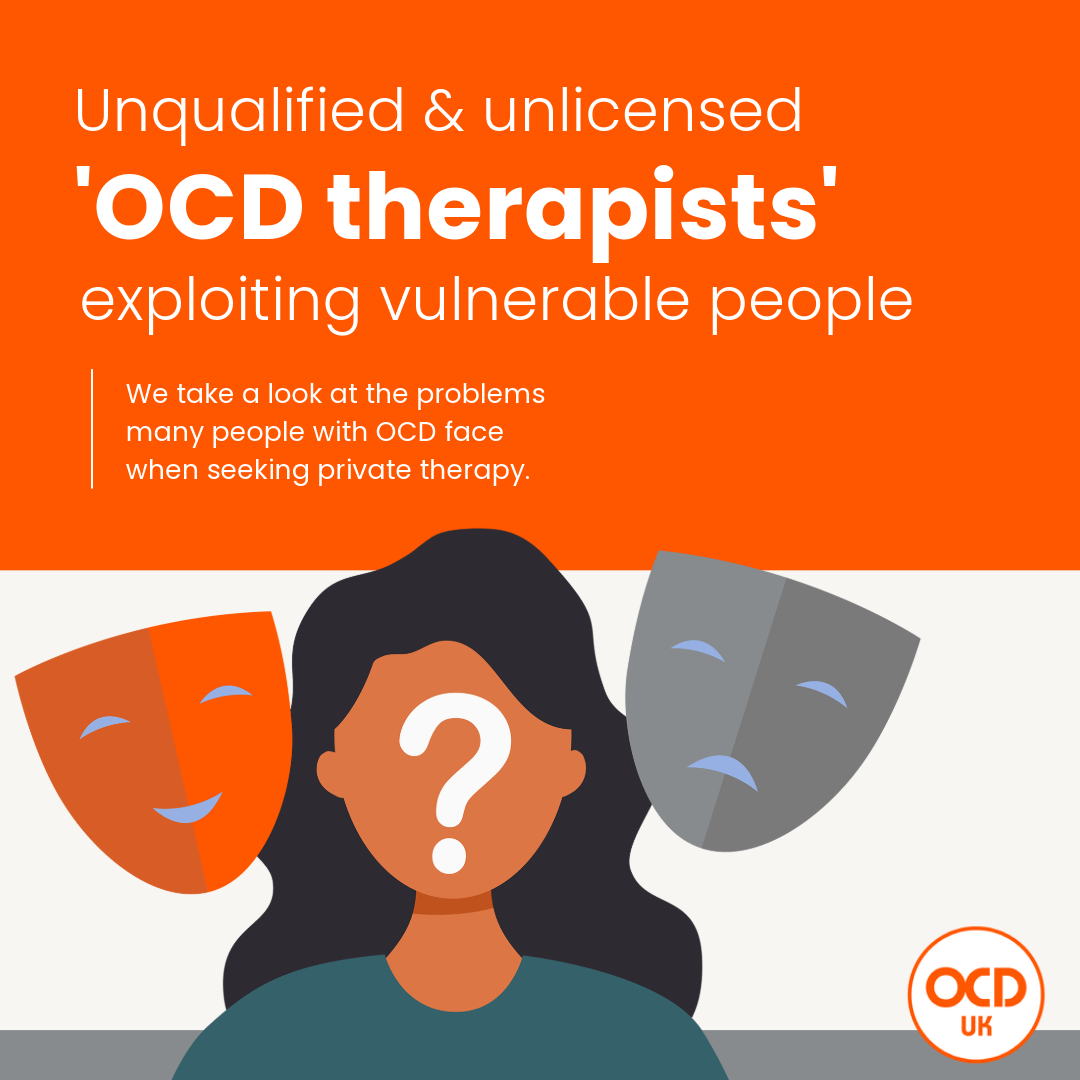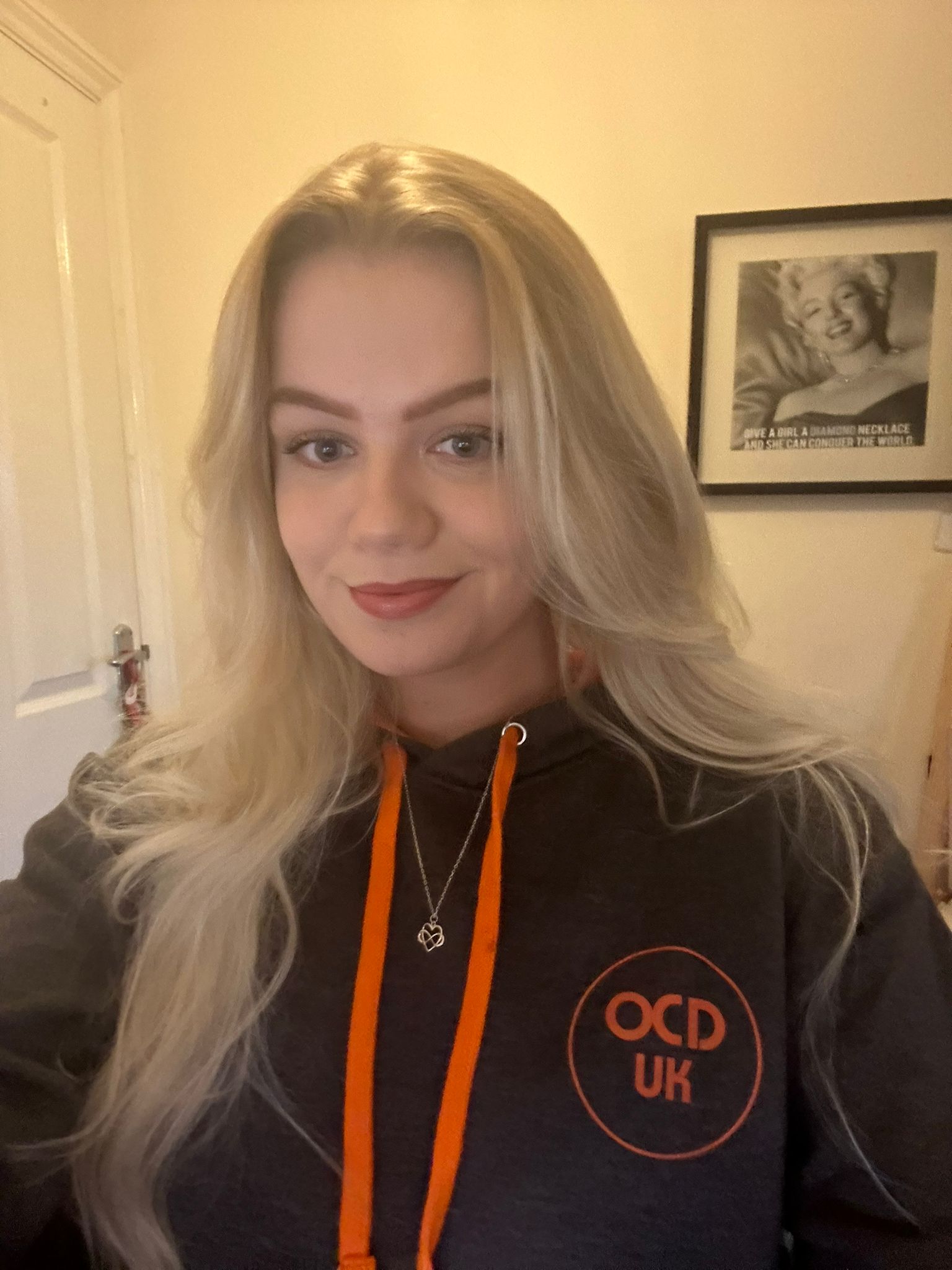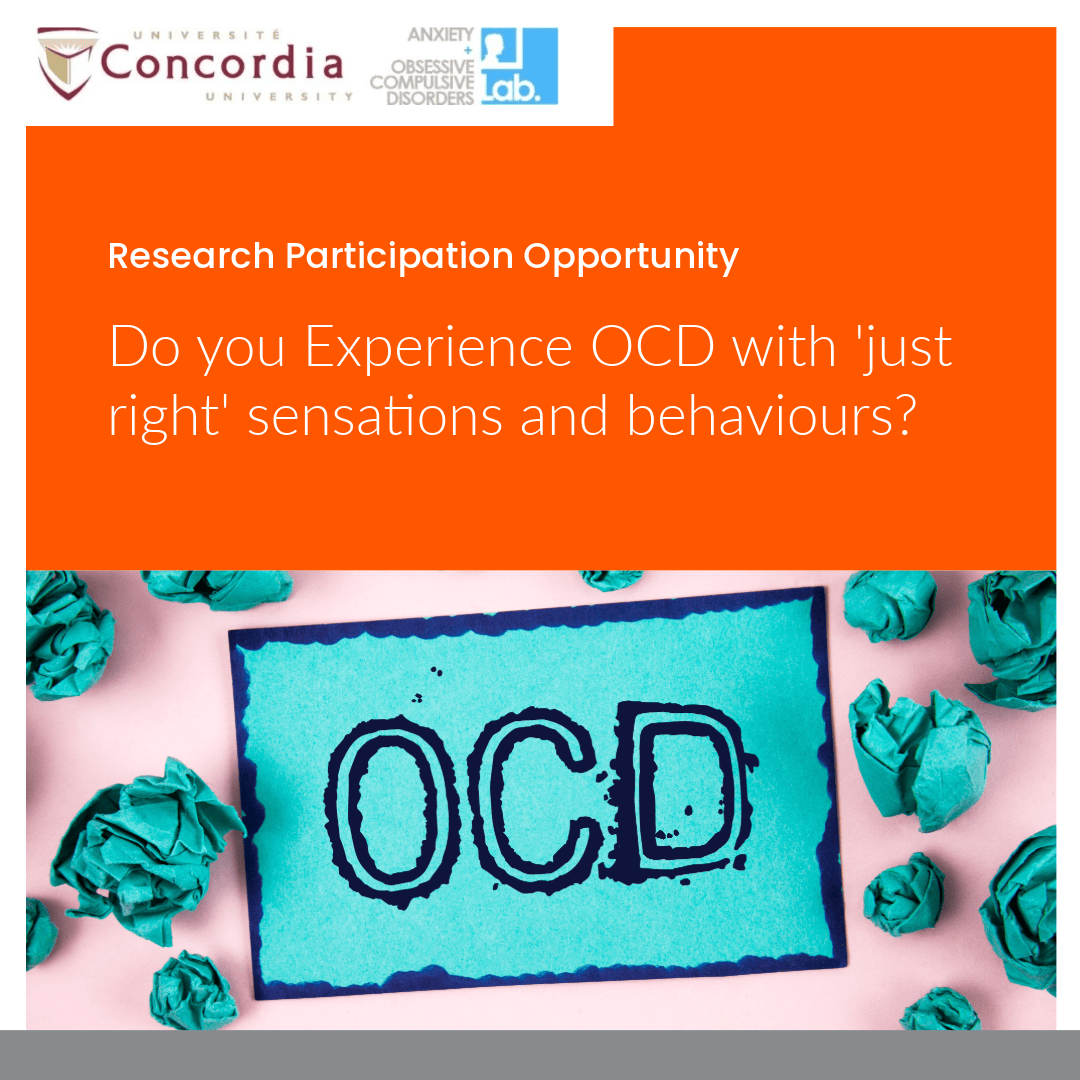Updated: 10th December 2024.
OCD can cause immense suffering for both adults and children who are affected by it. Understandably, people who are desperate to alleviate their symptoms sometimes turn to private therapists for treatment, but at OCD-UK we have been hearing increasing heart-breaking accounts from people who have received poor quality treatment from unqualified therapists, often at huge expense. What makes this worse, is that many of these unqualified therapists claim to be former, recovered OCD sufferers themselves.
We are writing this article in the hope we can help inform and educate people who read this, before such time they choose to seek help/treatment from any of these unqualified and unregulated therapists with the hope that we can prevent further financial and emotional harm coming to others with OCD by empowering people to make informed choices when seeking private treatment.
For the purpose of this article we are using the term ‘therapists’ to describe these unqualified & unlicensed practitioners, but this term is interchangeable with some of the other terms we have seen used by individuals and clinics run by individuals charging vast sums of money, when in fact they are not appropriately clinically qualified to do so. Other terms we have seen used include OCD specialist, OCD coach, OCD advocate, expert by experience and in some cases where people created their own therapy clinic, terms we have seen used includes clinical lead, head therapist and/or founder. All of these titles sound impressive, but should not be taken at face value. Yes, there are genuine health professionals that may use one of these titles, which is backed up by years of clinical experience, qualifications and supervision and that person may very well be suitable to help people with OCD. However, unfortunately we are also aware that in many cases there are people using these titles without clinical training, supervision or appropriate qualifications/accreditation. For clarity, at this time OCD-UK do not recommend any UK based OCD ‘recovery coaches’ or ‘expert by experience’ when we are asked to recommend private therapists.
What has become evident is an increasing number of awful experiences we are hearing from people who, often out of desperation, have turned for help to unlicensed, unqualified and in some cases unscrupulous OCD ‘therapists’, who promise freedom from OCD, but only at a price – a price that can run into the thousands of pounds.
The negative experiences of seeking out help from such therapists go far beyond the excessive financial costs. Our huge concern is also the quality and delivery of the treatment approaches and the way in which clients have been treated by these therapists. Such poor-quality treatment experiences can have long-term negative implications for the person with OCD, who can be left out of pocket and just as unwell as they were before, often with reluctance to try treatment again after such a bad experience.
A forthcoming academic research paper (due to be published soon), which we have been able to review, validates our concerns and highlights the horrendous emotional impact that unregulated and unqualified therapists can cause. We will link that paper to this page once it is published.
The problem of using unlicensed therapists is not new. The BBC published this article in 2021 which told the story of one such individual we were already aware of, who claims to be an online OCD therapist and an ‘expert by experience’ and charges thousands of pounds for treatment. In the article Jake and Laura share their stories, both of which are alarming, but sadly are representative of similar accounts we have heard from other people who have undertaken treatment, we suspect with the same individual. Similar stories were also aired on this BBC Radio 4 programme that was broadcast in September of that same year.
Worryingly, we are currently hearing on an almost weekly basis of similar stories from parents of children with OCD and adults with OCD that have reached out to the aforementioned and other similar OCD therapists or treatment services here in the UK.
HOW DOES THIS HAPPEN?
As it stands right now, anybody can call themselves a therapist, because the term ‘therapist’ is not a protected title. This means anyone can set themselves up to offer therapy/coaching services and charge for their service. As Jake describes in the BBC article, “a person has got quite a large following [on social media] and markets himself as a person with OCD and has got over it, you think that’s a great sign because they know how to get you better, and because they’ve been through it they understand.”
So when someone describes themselves as an OCD therapist/coach and an expert by experience it’s easy to understand why someone would turn towards them for treatment , especially when you see they have thousands of social media followers and regular testimonials, which we are told the coach actively seeks, as Laura highlights in the article. Understandably all of this can lead a person to think that this is somebody that can be trusted, which is how and why people can turn to these OCD ‘therapists’.
Similarly, we have heard of other poor treatment experiences from other OCD therapists out there that also change hundreds – sometimes thousands – of pounds for intensive OCD treatment services that claim to help people recover from OCD in a short period of time and also claim to be experts by experience. However, the qualification of those offering such services may not meet our minimum recommendations (see below).
REPUTABLE THERAPISTS
As people with lived experience of OCD ourselves we are always very clear we are experts in understanding our own OCD, but that does not necessarily make us experts in your OCD and certainly does not qualify us to provide chargeable therapy services.
A good therapist will belong to an appropriate regulation body that will have its own code of ethics, a complaints system, and minimum qualification requirements to help ensure a level of core standards. Therapists will also often be supervised by an experienced qualified therapist that will also belong to a regulation body. They will be clear about their qualifications and experience on their website and should be very open to you asking questions about these. Of course, not all regulation bodies are the same and we list the ones you should be looking for below.
OCD-UK will write to the new prime minister and call on the government for tighter regulation on therapists and therapy services. But we also know there needs to be a multi-faceted approach to ensuring the safety and well-being of vulnerable and desperate people. That must start with the NHS, especially at primary care level (in England primary care services are termed NHS Talking Therapies services, formerly known as IAPT). We need to have NHS services that are better informed and skilled in treating OCD, with reduced waiting times for treatment.
Until then, we will do what we can to help advise and guide people towards reputable therapeutic services and empower people to make informed choices when seeking private treatment.
HOW TO AVOID UNQUALIFIED ‘THERAPISTS’
It is widely accepted that the evidence-based treatment which is effective in treating Obsessive-Compulsive Disorder is Cognitive Behavioural Therapy with Exposure Response Prevention (often abbreviated to CBT with ERP). Such treatment should be delivered by professionally and clinically trained therapists who are regulated by an appropriate professional standards authority, for example the British Association for Behavioural and Cognitive Psychotherapies (BABCP), the Health and Care Professions Council (HCPC) or the General Medical Council (GMC).
However, we know that many people with OCD find it difficult to access good quality evidence-based treatment, either through the NHS or privately and sometimes, through desperation, will search the internet or social media and stumble across seemingly impressive websites of OCD therapists or treatment services that claim to offer amazing OCD therapy. Whilst searching for a professional’s accreditation can be hard and confusing, we have put together a short list below to try and help guide you when seeking private therapy as well as red flags you should be cautious about.
We recommend seeking qualified therapists that meet at least one of the following criteria:
- BABCP accredited (not to be confused with BACP) – for therapists
- HCPC registered – for clinical psychologists
- GMC registered – for psychiatrists
Although accreditation with one of those bodies is only a minimum standard, right now it is the best guidance we can offer to find a therapist that is at least working within therapeutic industry standards and is accountable to a professional body:
- To check a therapist’s name on the BABCP register, use https://portal.babcp.com//therapist/list (select distance from 1 mile (default) to a larger option for more results, enter your postcode and then click the ‘Find a therapist’ button.)
- To check if a clinical psychologist is HCPC registered visit https://www.hcpc-uk.org/check-the-register/ (select practitioner psychologist)
- To search for a psychiatrist you can check https://www.gmc-uk.org/registration-and-licensing/the-medical-register#searchTheRegister
Searching the BABCP, HCPC or GMC databases is relatively straight forward and easy to do, and you can of course also email us at support@ocduk.org should you need guidance on checking a practitioner’s accreditation. If you are seeking private treatment and your chosen professional is not listed on any of those three databases then you should proceed with caution because they may not have appropriate training and experience to treat OCD.
When you do find a registered therapist, you may still need to ascertain if they are knowledgeable in treating OCD and we have created some guidance on our finding a therapist page on our website to help with this.
The anecdotal experiences reported to us over the last few years by many service users we work with have led us to recognise certain red flags that we feel suggest caution should be used before parting with any money or beginning treatment.
RED FLAGS
- Claim to have created their own treatment approach
- Claims to get people to a point of recovery after a one or two week intensive course
- Blames patients for seeking reassurance or not following their ‘method’
- Ends treatment early, from just 12 minutes for example
- Claims patients are seeking reassurance if they voice concerns
- Claiming to me a member of a regulated accreditation body, but is not a member in reality (due to unscrupulous individuals claiming to have accreditation they do not really have, we recommend accreditation should always be checked)
DON’T BE PERSUADED BY
- Large number social media followers
- Lots of website testimonials
- Claiming their approach is NICE approved or displaying the NICE logo on their website
- Initials after names on website – Check out what those initials actually mean, and check any claimed accreditation is legitimate
- For example BACPm is a member of a counselling body, is not the same as being an accredited member of the BABCP, the accreditation body for CBT therapists
- Someone claiming to be a clinical, head lead, or supervisor – ask yourself what qualifies that person to be a clinical lead?
- Stating their service is ‘used and approved by the NHS’ – this does not mean it’s widely accepted by the NHS
- Claims of being a recovered ex-sufferer or expert by experience
We believe there is a world of difference between someone having experience and understanding of OCD (like our team at the charity) and being suitably qualified, clinically experienced and appropriately trained and supervised to actually treat OCD.
The heart-breaking experiences we have heard from people who have contacted us about the poor quality treatment they have received from unqualified therapists are concerning and upsetting, but we hope that through them bravely sharing their experiences, the information in this article will enable you to make an informed decision about your care if you choose to seek a private practitioner.























